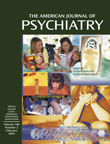Implications of Childhood Sexual Abuse for Adult Borderline Personality Disorder and Complex Posttraumatic Stress Disorder
Abstract
OBJECTIVE: This study examined whether women with a history of early-onset sexual abuse or those with late-onset sexual abuse were more likely to meet diagnostic criteria for both borderline personality disorder and complex posttraumatic stress disorder (PTSD). METHOD: The Revised Diagnostic Interview for Borderlines and the Trauma Assessment Package were administered to 65 women from three outpatient clinics in a metropolitan area. Thirty-eight subjects met criteria for early-onset abuse, while 27 subjects met criteria for late-onset abuse. RESULTS: The diagnoses of both borderline personality disorder and complex PTSD were significantly higher in women reporting early-onset abuse than in those with late-onset abuse. The trauma variables sexual abuse and paternal incest were significant predictors of both diagnoses. CONCLUSIONS: In contrast to those with comorbid diagnoses, some women with a history of childhood sexual abuse may be extricated from the diagnosis of borderline personality disorder and subsumed under that of complex PTSD.



